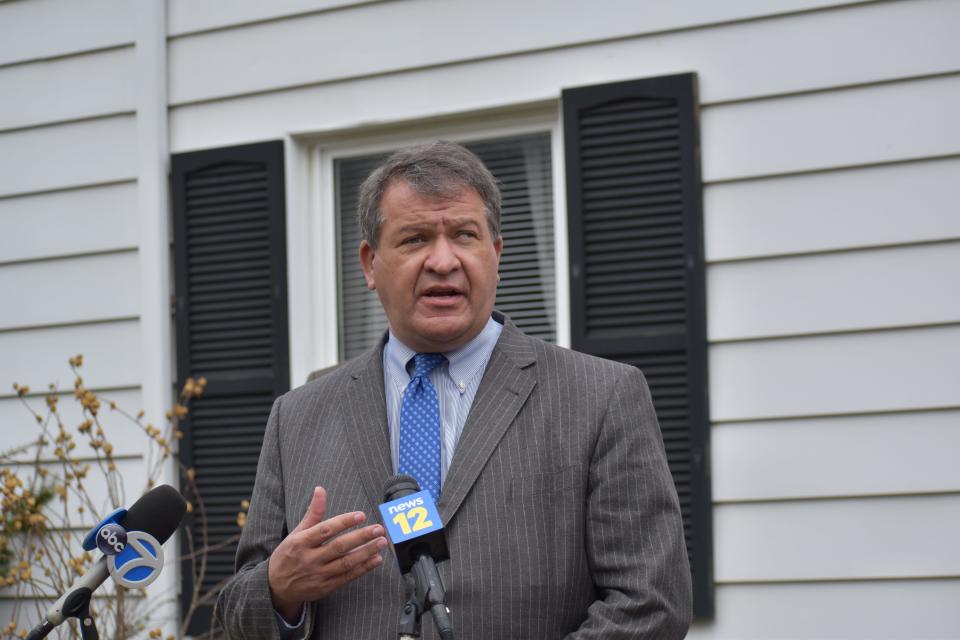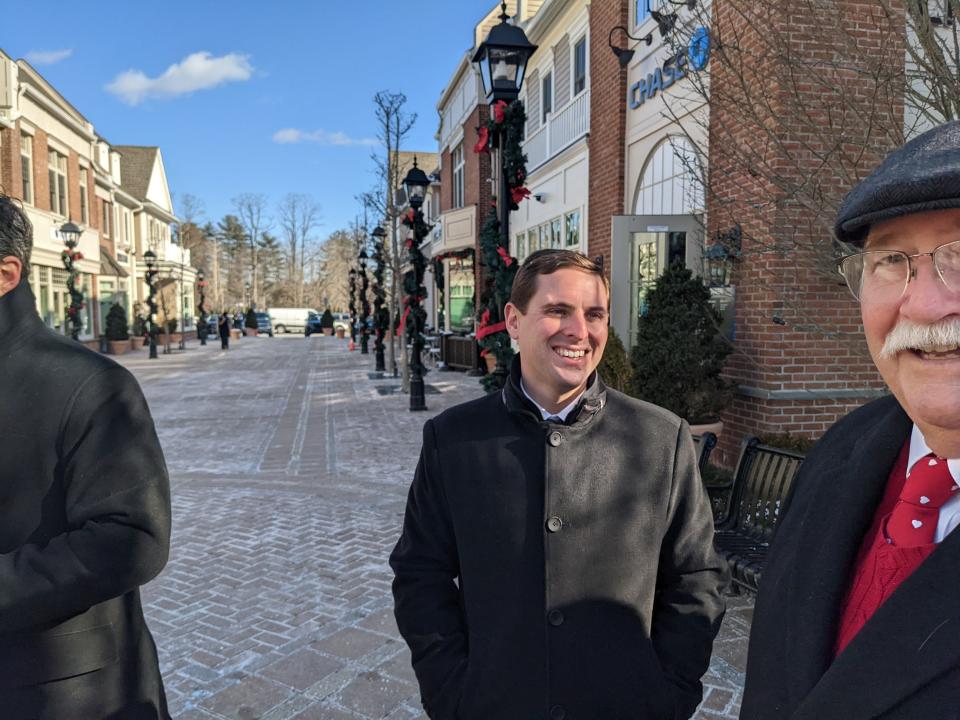Latimer backs down from Yorktown affordable housing in $10 million sewer grant dispute
Westchester County Executive George Latimer, a self-proclaimed proponent of affordable housing, this week gave up one of the county’s strongest incentives to create affordable units in predominantly white suburban communities.
Six months ago, the Rye Democrat declared he “would not back down” to Yorktown over making a $10 million sewer grant contingent upon adoption of zoning changes to promote affordable housing.
On Monday, Latimer did just that.

Latimer declined to be interviewed about his change of heart on housing, and his communications director, Catherine Cioffi, referred the Tax Watchdog to a statement issued in the county executive's name.
Latimer said he was prompted by Congressional approval of $1.2 million to design the sewer expansion for 315 homes in Sparkle Lake and on Birch and Sunrise streets. He agreed to move forward with the $10 million grant from county discretionary funds from its East of Hudson program, without any zoning changes to address fair housing.
“There are two important public policy issues we are committed to: advancing affordable housing and addressing pollution that threatens our drinking water,” said Latimer in a statement. “We want all Westchester municipalities to do their fair share to provide affordable housing - Yorktown included in the same manner as neighboring communities like Sommers (sic) and Courtland (sic) have already done. Protecting safe drinking water through the Hallocks Mill Sewer Extension Project is too important to be used as ‘leverage.’ “
Latimer cited “pollution” in a nearby reservoir that provides drinking water to New York City, as well as the award of federal funding, as justification for moving forward with the $10 million grant that has been in the planning stages for a quarter century.
"The federal government’s commitment of $1.2 million toward this end shows the priority placed on this remediation," said Latimer.
But Latimer declined to name the reservoir or cite reports about pollution threatening the city's pristine drinking waters.
Latimer: County executive to seek affordable housing concessions in Yorktown
Tied up: Sewer money for Yorktown hung up over affordable housing
Affordable: Builders launch affordable housing push
Tax Watch discovered there's nothing to remediate. According to a spokesman for the New York City Department of Environmental Protection, the sewer project was still in its planning stage. New York City has received no reports of threats of pollution from the neighborhoods in Yorktown Heights, said Douglas Auer, a spokesman for the city's Department of Environmental Protection.
He said they was no need for alarm.
"While there have historically been septic failures in the district area, none of those individual failures has been so egregious as to cause a specific water quality impact to Muscoot Reservoir," he said.
Fair housing advocates weren't happy.
Craig Gurian, executive director of the Anti-Discrimination Center, which brought the False Claims Act case over Westchester housing policy in 2006, said Latimer chose sides when it came to his priorities.
“He could have said it would be extraordinary if a municipality were so committed to segregation that it was ready to sacrifice clean drinking water to do so,” said Gurian. “The county executive has demonstrated that he is not prepared to take any serious steps to affirmatively further fair housing.”
The discretionary funding policy was put in place in 2012 to address the demands of the settlement of the case brought by Gurian, in which Westchester was found to have falsely certified it had affirmatively furthered fair housing in exchange for federal funds.
It spent an estimated $150 million to comply with the settlement, which included the creation of 750 units of affordable housing in the 31 targeted municipalities.
The funding policy was highlighted in housing monitor Stephen Robinson’s 2021 final report to the federal court, with Robinson singling out the Yorktown sewer project as an example of where the policy could reap benefits for affordable housing.
“To receive those funds, Yorktown will have to comply with the discretionary funding policy, and, accordingly, adopt at least some of the model provisions,” wrote Robinson.
Latimer’s decision to begin the process of releasing the funds was heralded by Yorktown Supervisor Matt Slater, a Republican running for state Assembly in November. Last week, a spokesman for Slater urged Latimer to decouple the sewer funding from the affordable housing policy.

On Tuesday, Slater declared victory.
“This project will significantly improve the water quality of the Croton Reservoir, a goal that is shared by all involved parties,” he said. “The County’s unlocking of the $10 million that has been earmarked for the Hallock’s Mill Sewer district clears the way for the first phase of the project that will enable 315 homes to have sewer service.”
Latimer’s decision came as a disappointment to Yorktown affordable housing advocates, who had turned out at Town Board meetings in February to encourage the board to require affordable units in its Yorktown Heights rezoning.
The Westchester County Planning Board had weighed in as well, recommending that Yorktown include a requirement that 10% of the units in multi-family developments be made affordable. The request was made as Yorktown reviewed zoning changes to accommodate a project with 165 units at Underhill Road.
Adopting the 10% set-aside would have required the developer to build 16 affordable units. The developer opposed any such requirement. The zoning was adopted without it.
Ken Belfer, chairman of the town’s Community Housing Board, had submitted his panel’s proposed ordinance, with the 10% set-aside.
“I’m not feeling optimistic now,” said Belfer.
The announcement of the federal grant award for $1.2 million by U.S. Rep. Mondaire Jones, D-White Plains, was the spark Yorktown needed to press Latimer once more to remove the East of Hudson funds from the discretionary funding policy.
Jones, a progressive Democrat who grew up in public housing in Rockland County, was unaware that the sewer project funding was linked to Westchester’s affordable housing obligations under its funding policy, said Jones spokesman Zach Fisch.
Jones said he relied on letters of support from a broad range of state and county leaders: state Sen. Pete Harckham, D-Lewisboro; county Legislator Vedat Gashi, D-Yorktown; Assemblyman Kevin Byrne, R-Carmel; East of Hudson Watershed President Richard Williams; and two Yorktown business groups.
None of the letters of support mentioned that the $10 million grant was hung up over Yorktown housing policy.
"Congressman Jones is committed to bringing federal dollars back to Rockland and Westchester,” said a statement issued by Fisch. “As part of that commitment, he engaged with local stakeholders to determine the most impactful projects in the region to support through the federal appropriations process.”
Follow Tax Watch columnist David McKay Wilson on Facebook or Twitter @davidmckaywils1. He has written about Hudson Valley public affairs since 1986. Check out his latest columns at lohud.com
This article originally appeared on Rockland/Westchester Journal News: Yorktown wins $10 million sewer grant with no promise on housing
